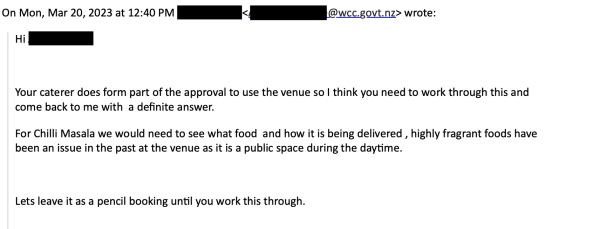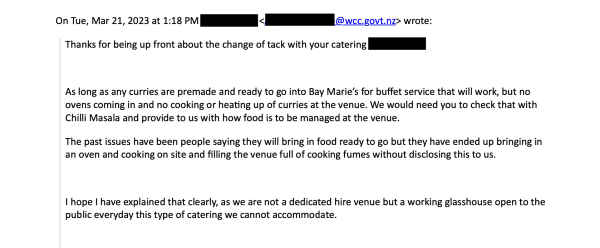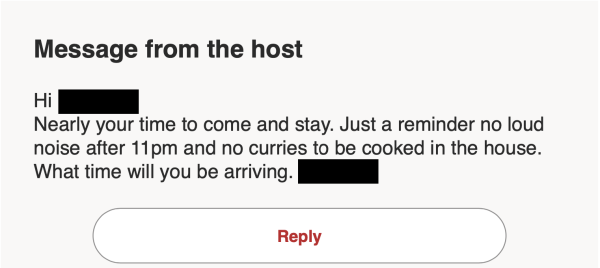Bookabach is investigating after Re: News raised questions about messages a host sent.
Two young New Zealanders of Indian background tell us about times they’ve felt judged or discriminated against by venues.
The wedding venue: ‘Highly fragrant foods have been an issue’
When Aradhana dreamed of her wedding day, she imagined a garden venue with “flowers and beautiful foliage and a really nice view” and of course delicious food.
The 28-year-old, who grew up in India and New Zealand, doesn’t want her last name used for this article as she’s worried about how it might impact her plans for her wedding.
She and her fiance loved the idea of Begonia House in Wellington’s Botanic Gardens and began the process to book it.
Begonia House is a tropical flower glasshouse run by Wellington City Council that’s open to the public, with a foyer available to hire for events like weddings.
Confirming a caterer is a standard part of the venue’s booking process, and Aradhana says things were going smoothly while they were looking at using a caterer called Upper Hutt Events Centre.
But when they decided to switch to a caterer called Chilli Masala, the Begonia House events manager told them she would need to see the food and how it was being delivered because “highly fragrant foods have been an issue in the past at the venue as it is a public space during the daytime”.
The email chain has been provided to Re: News.

The email from the Wellington City Council venue and bookings coordinator. Source: Supplied
Aradhana says she felt this was coded language, and made her wonder: “Are you trying to specify that Indian food is a problem?”
When her fiance asked for more details about what the issues with fragrant food had been in the past or what specifications they would need to meet, the venue manager told them as long as any curries were premade and ready to go in bain maries for a buffet service it would be fine, but no ovens were allowed to come in and no cooking or heating up of curries was allowed at the venue.
“The past issues have been people saying they will bring in food ready to go but they have ended up bringing in an oven and cooking on site and filling the venue full of cooking fumes without disclosing this to us,” the venue manager said.
“I hope I have explained that clearly, as we are not a dedicated hire venue but a working glasshouse open to the public everyday this type of catering we cannot accommodate.”
Aradhana says the fact “highly fragrant foods” were only raised as a potential issue when she mentioned a catering company with an Indian name made her feel “quite hurt” and not want to proceed with booking the venue.
“I think you could say that about any food.”
“Funnily enough, the first caterer also did Indian food, but it was just that we were going to have a mix of Indian and other more traditional Kiwi wedding food.”

A follow-up email from the Wellington City Council venue and bookings coordinator. Source: Supplied
The fact that Begonia House is a council-owned venue made the experience feel “absolutely horrible”, she says.
“After that we ruled out the option of going to this place, because it sort of felt like a tainted experience. We were really looking forward to this venue.”
A spokesperson for the Wellington City Council Botanic Gardens staff who are in charge of Begonia House said in an email: “I’m sorry to hear that the bride did not feel welcome to use the Begonia House for her wedding. We can do better in the way we communicate. It was not our intention to discriminate against her, but I recognise that this is how she felt. We will work to be clearer about the limitations of our facilities.”
They said the prep kitchen in the Begonia House is not a full kitchen, just a room with sinks and benches, and there are no exhaust fans, so they ask caterers to bring the food already heated.
In terms of “highly fragrant food”, they said in the past they have allowed caterers to cook food inside the Begonia House.
“Because we don’t have exhaust fans in the kitchen, the fragrance of the food permeated the Begonia House. After which we got complaints from members of the public who came to the Begonia House expecting to smell fragrant flowers but were met with the smell of fish or BBQ from the function the night before.”
“I recognise that these constraints could have been communicated more effectively. I’m truly sorry for the hurt the bride and groom feel. I can assure them that we have had this issue with all sorts of cuisine.”
The holiday home: ‘no curries to be cooked in the house’
As part of Krishna’s best man duties for his closest friend’s wedding, he needed to book a holiday home for the bachelor party.
Five months in advance, he booked on the website Bookabach for a night’s stay at a property on the outskirts of Auckland and paid the full cost of over $1600.
There was nothing in the house rules about cooking, but it didn’t matter either way, he says, because they weren’t planning on cooking anyway.
But the night before they were due to check in, he got an email from the property’s owner: “no curries to be cooked in the house”.

The message from the Bookabach host which Krishna was sent the night before check in. Source: Supplied
Krishna, who doesn’t want his real name used, and who was born in New Zealand and has Indian heritage, says he felt the message was only sent because he has an Indian name.
He shared a screenshot with the stag night group chat.
“We had a little bit of a laugh about it, but then also sort of realised that probably was a pretty inappropriate comment to make and it was slightly racist. Or that's how I felt anyway.”
The next day when he went to go meet the owner, he says she didn’t give him a set of keys to the house, which made him feel uncomfortable as it meant they weren’t able to lock the doors so they were worried about the safety of their belongings.
The owner also asked him for a copy of his credit card details, which he found odd because he had already paid in full for the property.
“She basically wrote down every single detail on my credit card including the three digits at the back and the expiry and everything so she basically had enough to do some online shopping if she really wanted to,” Krishna says.
“Then the final remark from her before I went off was, ‘So what are you boys going to be having for dinner?’ So she was really just checking that I wasn't going to be cooking curry.”
Sarah King, senior manager of public relations at Expedia Group, which owns Bookabach, says Bookabach has a zero-tolerance policy regarding acts of harassment, violence or discrimination.
After Re: News raised Krishna’s case, she says they are investigating the matter and have hidden the holiday house listing until it is resolved.
“Hosts should never take guest credit cards and if they try the guests need to call us so we can handle the situation,” she says.
‘It devalues and marginalises traditional or cultural food practices’: academic
Dietician and senior lecturer at University of Auckland Rajshri Roy says food discrimination and stigma can lead people to have a disconnect from their cultural identities and heritage, which can impact their relationship with food and nutrition.
“Discrimination or a lack of recognition of food practices can lead to disconnection from people's traditional ingredients, their cooking techniques, and their usual dietary patterns, which can then impact on their ability to maintain their cultural food identities, and that can contribute to a sense of cultural erasure.”

Dietician and senior lecturer at University of Auckland Rajshri Roy says it’s about more than food. Photo: Supplied
She says for herself, growing up as an Indian immigrant, she would think twice about bringing curry in her school lunchbox and would ask her parents to pack “more Western appropriate foods” because of fear of how others would react.
“It's important for us to acknowledge that there are impacts of racism and discrimination on food. And it can be quite complex and multifaceted.”
For people who might think ‘it’s just one meal’, she says “it's not about what we can, can or cannot do for one day”.
“Being told that, constantly reminds you of the fact that you might be an outsider and that you don't fit in. Telling you that you can't do something that's so culturally rooted in your values, might really affect your confidence and enjoyment of being in a country where you want to feel valued, and you want to feel included.”
History of similar experiences
Aradhana says this isn’t the first time she’s experienced something like this.
One time she and her partner were looking for a place to rent in Wellington, “and in the middle of a viewing with 20 other people, we had the landlord look at me and say ‘You're not going to be cooking lots of curries are you?’”
“And it's really just talking with friends that it truly made me realise that no one else has to experience something like this. So why am I feeling like I have to just push it aside?”
Krishna has previously worried people were judging his culture’s food before but he’s never had it spelt out in an email till the Bookabach incident.
“I work in a fairly large company, and I don't think I would ever just bring a curry from home and heat it up in the microwave for lunch, just purely because I wouldn't want to be made fun of.”
He says in the past he would have brushed off an incident like the Bookabach one but he has a young daughter and wouldn’t want her to go through something like this.
“So maybe I should speak up this time, rather than just you know, not saying anything.”
Top photo: Composite: iStock Armchairs facing landscape stock photo’ / Wellington Botanic Gardens, Wellington, North Island, New Zealand. (Photo by: Matthew Lovette/Education Images/Universal Images Group via Getty Images)
To get in contact with the author of this story email anna@renews.co.nz
More stories:
‘I’m cold, Mama’: the NZers struggling to stay warm this winter
Last winter 110,000 households couldn’t afford to keep their homes adequately warm, says MBIE.
Pay secrecy is hurting Pacific and Asian women the most
Māori women can miss out on more $400K compared to Pākehā men over a 40-year working life.
The joy and pain Ōtautahi has brought a Pakistani family
“I started wearing the hijab because I felt proud showing that I was Muslim after 15th of March."